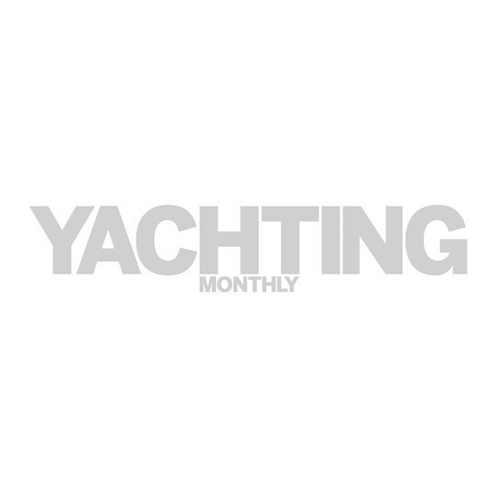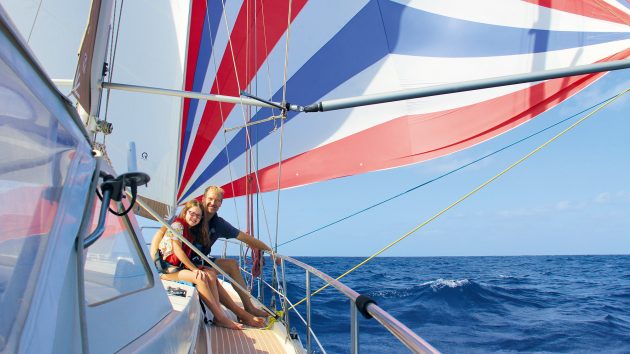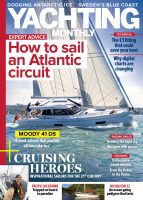Liveaboard sailing offers amazing adventures and family time, and it’s becoming easier to do, says Sophie Dingwall as she speaks to those who have gone across the Atlantic with a family
Modern life makes connecting digitally between people easy, but it can also isolate us from friends and family, and the natural world around us. While the negative effects of social media sweep through schools, there is a growing trend, especially among young people, to move away from a shallow online existence and focus on rich real-life experiences instead.
Thanks to the same technology, it is now easier to get away, in search of a more balanced way of life at sea, free from the pressures and expectations of everyday life. While the freedom of life at sea is a lifestyle that has long appealed to non-conformists, leaving the safety of social norms – houses, jobs, schools and the convenience of shops, cars and the internet – is no longer quite as absolute a cutting loose as it used to be.
Thanks to social media and online content, those that have done something similar have been able to share their experiences, offering advice and inspiration to millions of YouTube viewers and Instagram followers. The pandemic also helped to cement the fact that working remotely is not only possible, but increasingly commonplace and achievable, making the idea of being a digital nomad not in the least unusual. The combined effect is that more and more families are prepared to give it a go, whether it’s for a season, a year, or longer-term.
The attraction is clear. Being time-poor and glued to our phones reduces our engagement with both nature, friends and family. While being in a confined space for extended periods with no-one but your own family for company might not be everyone’s dream, for many having time to relax, engage and reconnect with each other is worth making significant sacrifices for.
‘Just do it!’ could be the rallying cry from families crossing the Atlantic, followed by, ‘Life is too short!’ While yachting is lazily assumed to be for wealthy elites only, with a bit of determination it can be surprisingly affordable and accessible to many families.

Stu and Lana Holmes on Amel Super Maramu, Oyai, cross the finish line with their family and crew
Making life changes
By allowing people to work from home and with many able to rent out their home, a location-independent lifestyle is now very much possible. The digital nomad lifestyle is an antidote to the traditional nine to five.
As a result, family entries for the Atlantic Rally for Cruisers have increased and in November 2022, a total of 16 family boats with 24 children crossed the Atlantic with the rally.
Marko Agthe, an environmental engineer from the landlocked town of Mücheln in the centre of Germany, purchased a Jeanneau Sun Legende 41 with his wife, Claudia and two daughters, Luise, 13 and Juliane, 16. He said, ‘We’re not considered normal from where we come from.’ It took three years to prepare their 1986-vintage boat, Good Fellow, for ocean sailing, replacing many of the sails, adding new standing rigging, electronics, water systems and a watermaker to bring her up to spec.
Marko’s daughter, 16-year-old Juliane, says, ‘We sailed a lot in the Baltic Sea, but I found it boring after a while. So, when we started to explore further afield, I was excited because I got to see new things and dolphins for the first time – it was incredible. The longest passage I’ve done so far has been four days, but I’ve seen St Lucia in a seminar, and I can’t wait to go there!’
Similarly, German couple Isa and Florian Tanger, owners of Sima, a Bavaria 42, live on board with their two little girls, Merle and Laura. Laura won the prize for the youngest entry at only two years old and won the hearts of everyone with her salt blonde, bouncy curls, rosy complexion, and intrigue for adventure and was often found fishing for sea creatures only to catch seaweed in a ploy to feed it to the adults.

Agthe family members enjoyed their meals together
Germany has one of the most generous family leave policies in the world. Parents are entitled to up to three years of leave, with the option to return to their job afterwards – something Isa and Florian have used to their advantage. ‘We have normal jobs, I am a logistics manager in a boatyard and Isa is a marine biologist. We saved for the trip with our family and have rented out our small house in Kiel. It was and still is scary sometimes but, just do it!’ says Florian.
Since living on board, the couple has a more balanced family life, allowing them to take an equally active role in raising their children.
Leaving school
But what about those children already rooted in the school system? Mainstream schools are regimented, adhering to fixed timetables and strict curriculums – quite the opposite of home schooling on a boat with no fixed abode, governed almost entirely by the weather. So, what are the advantages and disadvantages of removing a child from mainstream education?
The parents’ consensus is that the unique experience generates new perspectives and life lessons that are incomparable or even impossible with traditional education models. But, most importantly, it allows the family to spend honest, valuable time together. However, there are legalities, which differ depending on where you live, so be prepared to jump through some hoops and take on the role as a teacher.

The Agthe family on their Jeanneau
Going sailing for an extended period can give children a hands-on knowledge of how the world works. For example, using finite resources on board can help them appreciate where the commodities come from that we all consume, such as food, water and power or fuel, giving them a much greater holistic awareness of their place within the world. These situations invoke a higher level of maturity too. Alex, 13, from Take Off says, ‘I’m most looking forward to finding ways to entertain myself without connection, without my phone and simply being social with my family.’ With so many digital distractions, Alex understands that being in the moment isn’t enough for him – it has to be learned.
Educational resources differ from the classroom. For example, marine life, historical architecture, foreign food and new cultures present an entirely different range of topics to explore, as well as providing vast opportunities for child-led learning, to take in literacy, numeracy and critical thinking, alongside art, the sciences, history and a whole lot more.
Children also gain a wider awareness of the physical effort of travelling from one place to another and an increased respect for nature and the elements. Juliane, for example, is developing her interest in the ocean, contributing to the ocean’s health by collecting microplastics and recording the data. Meanwhile, Alex plans to complete his dive qualifications in the Caribbean, embracing the unique opportunities when enrolling in the school of life at sea.

The Tanger family two-year-old Laura with her seaweed catch
Home from home
Daughters Aria, 13, and Micah, eight, are sailing with parents Stu and Lana, on their 2002 Amel Super Maramu Oyai for a total of 16 months. Despite the limited space, the girls’ cabin situated forward is equal to that of a home on land, cheerfully decorated with cuddly toys nestled into cubby holes and walls almost entirely covered with drawings, posters and trinkets.
‘Let me show you where all the treats are stowed!’ says Aria excitedly as she unhinges a floorboard in the saloon, still clutching one of her many soft toys to reveal a treasure chest of their favourite biscuits and other sugary supplies.
Involving the children in the planning and preparation is paramount, from ensuring they know where relevant safety equipment lives to where the goodies are kept.

Stu Holmes, with his daughters Micah and Aria practise navigation, log keeping and the numeracy and literacy skills that go with it
And worrying about entertaining them might not be as hard as you think. The antidote to boredom is to create group activities, says Lana: ‘It’s Stu’s job to keep everyone safe and my job to keep everyone happy. I have a supply of books, games and crafts to entertain us.’
Those with siblings will often keep themselves entertained on board. Alex says, ‘When I crossed the Atlantic when I was younger, I remember playing hide and seek with my sister for hours together, we were never bored.’

Micah and Aria Holmes found ways to make their boat homely, with plenty of treats
Finding community
The children hold a significant place in the ARC’s community, all feel the strong bond and care for each other. At the start of the ARC Rally, a ‘kids’ club’ runs daily, giving the children an appreciation of the local wildlife and marine environment, broadening their horizons, and allowing them to become more involved in the local community.
The children develop physical and mental resilience by teaching practical skills such as dinghy sailing, kayaking and horse riding, helping them build strong friendships with peers and adults. The kids’ club has helped the children make new friends, find their own identities, gain confidence and a better understanding and knowledge of the world outside of school. ‘Most of the other kids are on the same dock, and I think the kids’ club is really great because I’ve made lots of friends,’ says Ellinor from Sweden.

Friends reunite after the ARC Rally arrival
Ellinor’s mother, Sofia adds, ‘The kids’ club is good for her and us. We have time to get jobs done while she enjoys herself with her new friends. She studies English but being here we’ve noticed it’s improved significantly. ‘As a parent, it’s hard to know if you are doing the right thing but we think the time we spend together as a family is positive.
‘Ellinor has already experienced so much, and the biggest adventure is still to come! It’s important Ellinor goes to school to have a balance and can reach the next level in her education too.’
Communications
Typically, the cruisers yield themselves to nature and the freedom that comes with it, often engaging with modern communications but less than the average user. ‘We spend more family time together and learn how to live and enjoy the moment, away from distractions,’ says Marko.

Aria Holmes takes on radio duties for the fleet radio net
While it is something to escape for many, social media has helped to open people’s eyes to the possibilities out there and made the adventure of stepping into the unknown seem more attainable, including cruising communities like the ARC Rally.
Marko, owner of Good Fellow has a contract with a German TV crew and is documenting their journey from the everyday chores down to the nitty-gritty. He says, ‘For me, it’s important to highlight this lifestyle and show the German people how much the children can learn from an experience like this. The government view this as a “holiday” but it is so much more. We’re surrounded by once-in-a-lifetime experiences and opportunities that my children are learning so much from.’

The ARC 2022 children all quickly made good friends, and kept in touch on the crossing
Schooling alternatives
The first thing to do is familiarise yourself with the rules and regulations in your country and then contact the educational authorities for the relevant policies available.
In the UK, for example, you as a parent (rather than the state) are legally responsible for ensuring your child receives an education, and the government or council have very little jurisdiction over you in this. Your local council will want to know that if your child is not in school that they are being properly looked after and educated, but you are not accountable to them for the education they receive.
It is worth noting that the UN’s Convention on the Rights of the Child requires states to prove a right for children to express their views and for due weight to be given to those views, in accordance with the age and maturity of the child.

Juliane enjoyed working on her artwork skills in a ‘classroom’ which her friends would envy!
Home schooling is more likely to work if you have discussed ideas as a family, and the children have been able to contribute to the plans you make.
What boat school looks like, however, is wide open. There’s often more than one route to go down, and options vary from structured curriculums to flexible systems whereby parents can tailor curriculums to their timescale, location and agenda – often better suited to the cruising lifestyle. Parents often report that home schooling is the hardest part of their lifestyle and that maintaining contact with teachers is crucial for the children’s education and their parents’ sanity. Luckily, technology today makes this easily achievable and relatively cost-effective too.
You may want to be fairly unstructured and use child-led learning, letting your child pursue interests as they naturally occur from your travels, though this isn’t without its challenges. For those taking a finite amount of time out of mainstream education before a planned return to school, however, keeping up with what peers at home are learning is important.
Many parents choose to use tutors, remote learning or even following their home school curriculum while they are away. Seek out the experts and other support to ensure your children are educated to similar standards to mainstream schools.
Enjoyed reading this?
A subscription to Yachting Monthly magazine costs around 40% less than the cover price.
Print and digital editions are available through Magazines Direct – where you can also find the latest deals.
YM is packed with information to help you get the most from your time on the water.
-
-
- Take your seamanship to the next level with tips, advice and skills from our experts
- Impartial in-depth reviews of the latest yachts and equipment
- Cruising guides to help you reach those dream destinations
-
Follow us on Facebook, Twitter and Instagram.





